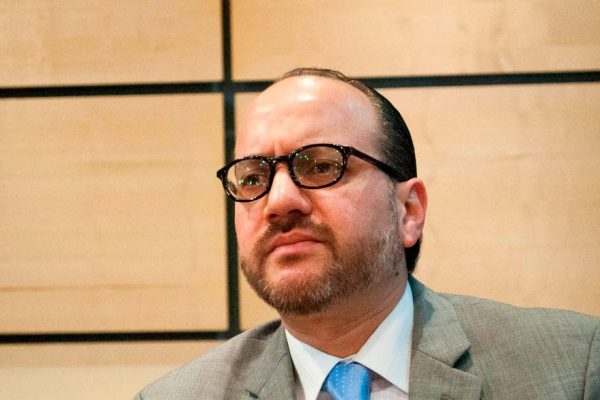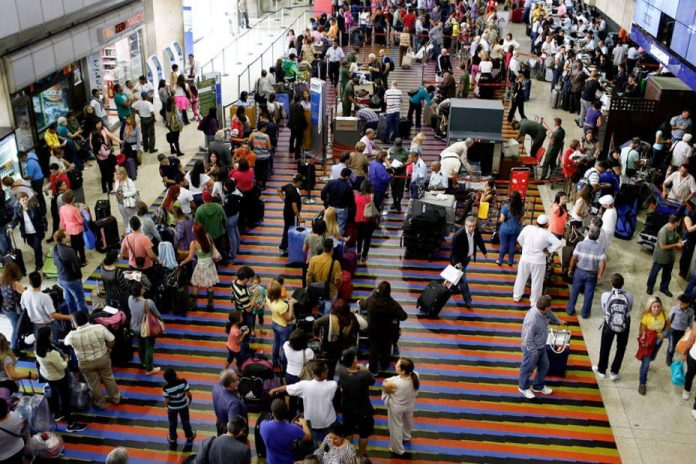In the first sentence of the year, the Constitutional Chamber of the Supreme Tribunal of Justice (TSJ) seems to forget that it has accused the National Assembly (AN) of being in contempt of its decisions on the case of the deputies of the Amazonas state for four years in a row.
The word “contempt” does not appear in any of the six pages of the decision No. 1 issued by the Chamber on January 13 where it admitted the request for legal protection made six days before by former Councilor Enrique Ochoa Antich to analyze the situation created by the existence of two boards of Parliament.
This absence is striking because the alleged breach by the Assembly of the decisions of the Electoral and Constitutional Chambers regarding the suspension of the assumption of office by the deputies of Amazonas has been the excuse used by the highest court since 2016 to cancel all the decisions taken by the deputies, and to seize from it the vast majority of their functions.
Yet, this is not the only thing striking about the decision of the Supreme Tribunal. The Constitutional Court also seems to recognize the directive headed by the questioned deputy Luis Parra, as can be read in the ruling containing forewords by the president of the Chamber, magistrate Juan José Mendoza:
“Given that it is a public, notorious and communicational fact that on January 5, 2020, the deputies met at the headquarters of the National Assembly to elect the Board of Directors corresponding to the year 2020, as provided by Article 194 of the Constitution, electing Luis Parra as president, Franklin Duarte as first vice president, and José Gregorio Noriega as the second vice-president, who claims to form that new Board of Directors, this Chamber considers it essential to request the aforementioned deputies who claim to integrate the Board of Directors of the AN that, within five days of their notification, inform this Chamber on the parliamentary act of conformation of that new Board of Directors of the AN and the quorum of the session, both for the installation and the approval of the Directive, which must be supported with a certified copy of the act”.
It seems that the magistrates did not pay attention to the statements made by Negal Morales, former secretary of the National Assembly and a member of the group of opposition deputies that allied with their counterparts from the ruling party to try to replace Juan Guaidó.
The parliamentarian and former leader of Acción Democrática (Democratic Action, AD) wrote in his twitter account that “Even without quorum and without the majority of the parliamentarians in the hemicycle, today we decided to take the AN by force, in alliance with the Partido Socialista Unido de Venezuela (United Socialist Party of Venezuela, PSUV) and Nicolás Maduro to achieve a change in Venezuela, with the participation of all”.
The Chamber also failed to take into account the statements of Parra himself, who said he had lost the record where the attendance is recorded, which is the necessary support to verify the quorum to elect the board.
As stated in the sentence, Ochoa Antich referred his request to the fact that this election was made with the presence of 81 deputies, in contradiction with Article 221 of the Constitution that sets the quorum to hold the sessions of the National Assembly at the absolute majority of its members, that is, 84 out of the 167 members.
The highest court neither paid attention to the request of the petitioner, who points out to the members of both directives, the Commander of the National Guard Zone 43 of Caracas, the commander of 432 Detachment of the National Guard and Major General Fabio Enrique Zavarse Pabón as complainees.
It is noteworthy that the Chamber only requested information from the board chaired by Parra but not from the one chaired by Guaidó. This violates the right to equality and defense of the board represented by the latter, the principle of procedural balance, and ignores this board.
The aforementioned is alarming since every court must consider all the parties indicated by the plaintiff as complainees before making a final decision on a case. Excluding some of them without a legal basis, just like The Constitutional Chamber does it in its first sentence of 2020, shows partiality.
The Chamber also ignores the provisions of the Assembly’s Rules of Interior and Debates since according to this it is the outgoing president of the Parliament who is responsible for installing it every January 5 (article 27.4) and establishing together with the secretary of the outgoing board if there is quorum or not for the vote on a new one (article 33.2). In this regard, the highest court also had to direct the request for information to the 2019 board to find out who made up the 2020 board, instead of the board chaired by Parra.
Paving the way for recognition?
On the other hand, the doubtful election of Parra, Duarte, and Noriega was already endorsed by the questioned National Constituent Assembly (ANC), whose president, Diosdado Cabello, said: “We will contribute so that the AN can get out of contempt and function for the benefit of the Venezuelan people”.
Could the TSJ do the same? History has shown that the Constitutional Chamber is capable of contradicting itself at any moment, but in the light of its previous sentences, it cannot recognize the new board because the steps established by it to have the contempt status lifted were not fulfilled in the January 5 session.
The supreme tribunal ordered in its sentence number 2 of 2017:
“Given the obvious situation of contempt in which the National Legislative Power and its expired Board of Directors find themselves [about the one headed by Henry Ramos Allup in 2016], and the consequent nullity of the actions carried out by them during the year 2016 and so far in 2017 including the invalid installation of the second annual session, the appointment of a Board of Directors and a Secretariat, as well as the ordinary sessions convened by it, this Chamber cannot validate the proceedings and, consequently, orders the deputies who formed the Board of Directors of the expired period to abide by the decisions issued by this supreme tribunal before proceeding to the installation of the session corresponding to the year 2017”.
In other words, to get Parliament out of the alleged illegality in which it finds itself, the directive headed by Ramos Allup should return to divest the deputies of Amazonas and then convene an installation session to elect a new directive. Fitting the election of Parra in this Gordian knot would imply the TSJ to contradict more than 100 sentences that it has issued against the AN declaring its contempt. Unfortunately, it would not surprise us either, since it has proven not to be impartial or independent.
How does it affect you as a Venezuelan?
The existence of another AN board of directors only aggravates the political conflict and the institutional crisis that the country goes through, which already has two supreme courts, two general prosecutors, two presidents and a parallel Parliament (the ANC). Likewise, an eventual recognition of the Parra directive by the TSJ would not only once again show how this body seeks to guarantee and protect the interests of chavism and not of the citizens against the possible abuses of power, but would also imply another blow to the essence of the democratic system where the majority decides.




